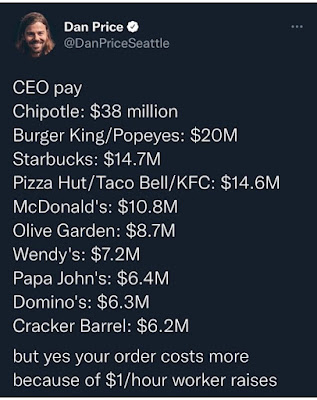The chief executive of the Wisconsin Economic Development Corporation and the secretary of the state Department of Workforce took to the
Journal Sentinel to "inform" readers of a workforce
paradox in Wisconsin. Or, to at least lay the groundwork for such a talking-point to help move forward more legislation which will supposedly address this manufactured paradox.
It's amazing when similar-minded people whom have advocated less regulation, lower taxes, and the general expansion of service industry jobs over the past three decades suddenly decide
manufacturing is a crucial sector and that we must have a renewed focus on
industrial policy.
Nevermind that the typical economic
policies they've pushed over the past few decades have decimated manufacturing
employment. Policies that have weakened unions, driven down wages, and outsourced many of the good-paying manufacturing jobs to low-wage countries. [The combination of
low-road economic development and
neoliberal policies.]
Now the government must rework the educational system's curriculum, provide more
job training, and provide tax credits and relocation incentives to improve the same manufacturing employment that past policies decimated. Regardless of the fact that, "There is little evidence of absolute declines in cognitive or hard skills in the United States or generally poor performance relative to other advanced industrialized countries," as reported by associate professor
Michael Handel.
The writers engage is some fairytales to make their point in the article. They claim part of the reason manufacturing employment and jobs have declined is because we haven't talked about them enough as being desirable employment. They also regurgitate the well-worn idea of structural employment - matching people who can do the jobs with where the jobs are needed. [As
Rortybomb informs, "A report the IMF put out -
The Great Recession and Structural Unemployment - which found find that structural unemployment is 1%-1.75% nationwide, with skills being 0.5%."]
People have chosen service jobs over manufacturing because of the diminished wages offered by the manufacturing jobs. The manufacturing jobs today have lower wages, reduced health care and slim to non-existent retirement packages. Why would a worker chose a challenging, skilled manufacturing job under such circumstances when they could just as easily take a similarly compensating service industry job, which is often, also, much less physically demanding?
If the writers were serious they would be addressing trade agreements, tax-policy toward outsourcing firms, and discussing the need for a comprehensive industrial policy focused on America's need for a strong manufacturing sector and it's link to our infrastructure and self-sustainability. Instead we get more apologetics and scapegoating. Like most businesses these days, the manufacturers want the inflated profits, but none of the social responsibility of good wages and a secure retirement for their workers.
It's not that we don't have workers who can do these jobs, it's just easier [cheaper] for the well-represented [lobbyists] manufacturing companies to appeal for government hand-outs than to pay wages necessary for the work. Thus, a whole cottage industry of cranks has arisen to create this fantasy of
structural unemployment and skills mismatch.
Rather, this is simply a story of supply and demand. Until the manufacturers are willing to pay respectable wages to attract workers to these jobs, the manufacturers will continue claiming the educational system must be failing, the government isn't doing enough, and everyone but the manufacturers are responsible for these
supposedly unfilled jobs.
For Further Reading:
Has The Great Recession Raised Structural Unemployment?
Latest in (Lack of) Structural Employment








